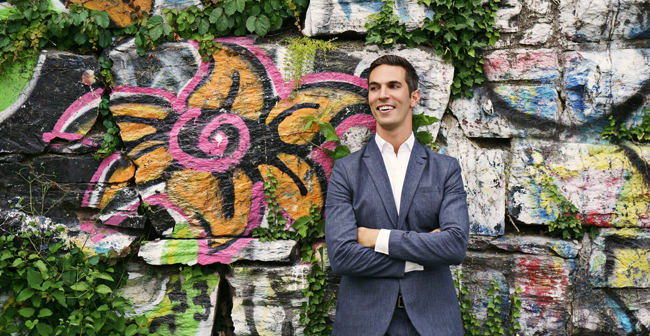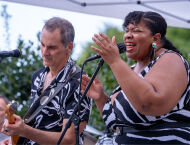Culture
 Photo: Duhon Photography
Photo: Duhon Photography
Ari Shapiro Considers All Things
October 1, 2018 @ 12:00am
“I got into journalism on a fluke. I was finishing college and I didn’t know what I wanted to do when I grew up.”
Drinking from a refillable coffee cup and donning a black polo on the patio of Big Bear Cafe in DC’s Bloomingdale neighborhood,
Ari Shapiro is explaining that even though he didn’t practice journalism during his formative years, he has since crafted a career as one of the most recognizable voices on National Public Radio (NPR).
“I applied to a million things and thought an NPR internship would be cool,” he tells me. “I got rejected for the NPR internship, and pretty much everything else I applied for, too.”
What once sounded like a cool idea would eventually lead to an esteemed career as a rotating co-host for flagship news program
All Things Considered, a position he’s held for the last three years. The 39-year-old journalist’s voice is heard by 14.7 million listeners on weeks where he’s featured.
Despite his penchant for journalistic storytelling, Shapiro is far from just a news radio rock star; he’s a singer as well. After an evening hang at his home in 2008 with members of Portland-based Pink Martini – a self-described United Nations house band of 1962 meets Lawrence Welk on acid – ended in a sing-along, he was invited to provide vocals for the band in the studio and then live, a collaboration that’s continued over the years. He’s set to guest perform with the band at The Anthem on October 7.
A man as handsome and sultry sounding as Shapiro talking about rejection seems ludicrous at first; as you look at him and hear him speak, you can’t imagine him being less than successful at anything.
“Part of it is that rejection is a part of success. The repetition of rejection is what will eventually lead to success. That’s a necessary step along the way.”
All Things Considered is comprised of four hosts sharing duties on a bi-weekly basis.
Shapiro’s on-air days starts at about 8:30 a.m. after a bike ride to the office (he has never owned a car). An editorial meeting at 9:30 a.m. follows, where he pitches three fully formed ideas: an angle on national news, a “page two” story and another he describes as “joy, surprise and uplift.” He then begins working with editors and producers to craft introductions, develop interview questions and review edited versions of earlier conversations – all this before going live at 4 p.m.
Shapiro delivers stories with calm and candor, even when his guests get hostile or fiery, or the interviews venture into weird territory. These authentic interactions are largely absent in print media; the back and forth between the interviewer and interviewee often gets lost when the quotes are broken up and words hit the page.
“That’s one of the things I love about radio,” he says. “There’s something so intimate and nuanced about hearing a person’s voice that I don’t think comes across as effectively in print and even on television. There’s just something about hearing a person talk that I think goes around the defenses we all put up and the judgments we automatically make about people when we see them. It accesses something that is so fundamental to the human experience. There is no form of communication older than audio storytelling.”
One host is on call until 10 p.m. each night to provide updates for the West Coast feed as news breaks. The evening before our coffee-charged conversation, Shapiro was in the NPR offices lending his voice to updates on houses catching fire in Massachusetts, Hurricane Florence’s landfall and the prospects of Jeff Bezos’s second Amazon headquarters. Like a healthy diet of all things in variation, the diversity of stories keeps Shapiro enthusiastic about the program.
“The thing that really appeals to me is the mix. It’s not that, ‘Oh, I get to do an interview about the thing I really love.’ It’s that I get to keep doing interviews about different things all the time, and it goes back to that idea of being curious and learning and finding out more about the world.”
While Shapiro’s work no longer focuses solely on hard news, he’s still a nationally renowned journalist in a political atmosphere that has become hostile to some in the media. And though he’s not appreciative of President Trump’s tirades against the Free Press, he thinks the outbursts have helped provoke a sense of transparency in newsrooms nationwide.
“I’ve seen an evolution where I now think more news organizations and journalists are saying, ‘Actually, we have to do a better job than we’ve done in the past of explaining what we do, how we do it [and] how it’s important to democracy,’ and I don’t think those are bad things. That’s something we should have been doing for a long time, and the attacks on the media have woken us up to the fact that we can’t just assume people know why a free press is important and what the role of the media in democracy is.”
Shapiro mentions a reporting trip to Michigan scheduled in mid-October for midterms. He says the Midwest state represents a convergence of several ideas rolling around in his head: the state recently turning red, the auto industry and tariffs, and an intriguing place to reflect on the decade since the nation’s financial collapse. When I press him to project even further in to the future, he hesitates a little.
“In my career, I’ve never known what I wanted the next step to be. I’ve always felt like as long as I’m happy where I am and can forecast at least a year into the future, I’m in a good place. It feels like I’ve only just started. [All Things Considered host] Robert Siegel, who retired last year, hosted the show for 30 years, so I’m definitely not looking to move on anytime soon.”
Shapiro’s parents both spent their lives in academia.
His father was a computer science professor from San Francisco and his mother a communications professor from Chicago. In an educator-led household just outside of Portland, Shapiro was raised in environment that embraced curiosity. Imagination and discovery were not relegated to a classroom or strictly tethered to homework; instead, a willingness to experience the world in full was embraced and shared.
“There was a sense that the more you know about the world, the more interesting the world becomes, and you can learn anything you’re curious about. [My parents] were always grading papers or developing lesson plans. It wasn’t you clock out of work at the end of the day and you get to enjoy your life. The work is integrated into your life. I feel like that’s true of what I do now.”
Despite his piqued curiosity under the influence of his parents, broadcast journalism wasn’t an obvious path for a young Shapiro. He wasn’t sitting in his bedroom with a tape recorder working on a faux talk show or jotting down questions about the world he wanted to investigate.
“NPR was on in my house all the time, and in the car. I actually never did any journalism when I was in high school or college. I didn’t take a journalism class. I didn’t write for the school paper.”
Instead, Shapiro majored in English at Yale, where he learned how to “read and write and think.”
“I think that’s the value of a liberal arts education, whether you major in English or history or psychology, or anything else. It’s not so much that now I can understand Shakespeare or Dante, it’s that I can read a complicated text, make sense out of it and explain what the important thing is. That’s a skill I use when I’m reading a Supreme Court opinion or a report from a think tank.”
A lot has changed for Shapiro since his initial NPR assignment as Nina Totenberg’s intern in 2001. Before injecting his voice into national conversations, he was charged with transcribing audio, providing research on Supreme Court cases and scheduling interviews.
“I remember the first time [Totenberg] let me do an interview for a story. It was about a medical marijuana case, and I was so nervous and stressed. I was preparing for days, and I went to do the interview and the guy was giving these really slow, vague, one-word answers. I finally realized he was totally stoned.”
Pink Martini started playing in the mid-90s, when Shapiro was a high school student pondering an alternate reality of the world after reading Guns, Germs and Steel.
Before he stood onstage as a member, Shapiro geeked out as a fan with X’s on his hands in Portland bars that no longer exist.
“I remember a show they did at the employee party for a bakery where a friend of mine worked,” he says. “Now they play at Carnegie Hall, and back then they would play anywhere, anytime, for any reason.”
After college, he became friends with the band to the point that Shapiro’s house was a customary stop when Pink Martini performed in the District. Members of Pink Martini and another Portland band, Blind Pilot, swung by his barbecue 10 years ago and ended up staying late night, circling his piano and singing together. People who never sang stood side-by-side with professional musicians, and everyone tackled song after song in unison until 3 a.m. The next day, Pink Martini’s founder Thomas Lauderdale told Shapiro his voice would be perfect for a song on the band’s next album.
“At first I thought it would never happen, and then I thought if it did happen, it would be like that one time I did that thing with Pink Martini.”
The radio personality was sure the song wouldn’t make the album after recording in Portland, but then it did. Lauderdale then encouraged him to perform live with the band in front of 18,000 people at the Hollywood Bowl.
“It was incredible,” Shapiro says. “Backstage they have big black-and-white photographs of the legendary acts who’ve performed there over the years, so you’re waiting to go on and you see Jimi Hendrix, Judy Garland and The Beatles all on that stage you’re about to walk onto.”
Four albums later, though not a permanent fixture in the band nor always on their tour schedule, the list of songs Shapiro performs with Pink Martini has expanded. And because the band produces music with lyrics in foreign languages, part of his prep is nailing the pronunciation.
“I write them down phonetically on a piece of paper and carry it around in my back pocket for weeks just drilling them into my head. For the [upcoming] shows, I’m trying to learn two new songs in Japanese and French so I’m literally walking around town murmuring Japanese words under my breath.”
With the opportunity to express himself sonically with Pink Martini, and other side projects like cabaret shows and guest performances at venues including the Kennedy Center, Shapiro tells me he has little interest in recording a solo album. The contrast between being onstage and on-air provides him with enough of a shake-up from journalism.
“Hosting a show like All Things Considered, it’s just you and your guest in a studio, whereas at a Pink Martini show, the audience is right there and you can hear them responding or not responding. You have an experience that is in real time, that is real engagement with them, that you don’t really get on the radio.”
I push him on the album, facetiously suggesting a mixtape or SoundCloud page. He playfully shrugs, but a man like Shapiro won’t outright say “No.” Besides, he’s already in a profession he didn’t expect, and moonlighting as a singer for a band he followed in high school. For him to completely rule anything out would be uncharacteristic.
“Never say never.”
Catch Shapiro with Pink Martini at The Anthem on Sunday, October 7. Doors at 6:30 p.m. and show at 8 p.m. Tickets start at $35 and can be purchased at www.theanthemdc.com. Follow him on Twitter and Instagram at @arishapiro, and learn more about All Things Considered at www.npr.org/programs/all-things-considered.
The Anthem: 901 Wharf St. SW, DC; 202-888-0020; www.theanthemdc.com







